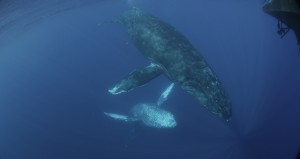Mysterious Sounds Recorded Near Humpback Whales off of Maui
A research biologist and co-founder of the Whale Trust Maui is making national headlines after recording heartbeat-like sounds produced by humpback whales, that are different than any other sounds previously recorded.
The research conducted by Dr. Jim Darling and his team, is featured in an article published today by National Geographic, and is the subject of a recently published paper in the Journal of Acoustic Society of America.
At around 40 Hz, the low-frequency sounds, described as “pulse trains” were noticed when adult females had male company, suggesting the sounds may possibly be connected to mating, according to information released by the Whale Trust Maui.
Researchers say typical humpback whale sounds fall between the 80 to 4,000 Hz range. The newly discovered sounds fall just above the lower threshold of human hearing, and can be easily masked by ocean waves, vessel noise or more typical sounds of nearby humpbacks, the Whale Trust Maui states.
Darling describes them as “ethereal” and difficult to hear except on exceptionally quiet, calm days at sea.
These new findings have opened a window for whale communications researchers and have invited curiosities surrounding the behaviors connected to these sounds. If the sounds can be conclusively linked to the humpbacks, researchers say “this would add a whole new dimension to the already complex repertoire found in this species’ communication.”
“The first time I heard them, or realized I heard them, was in 2005 when recording social sounds from an active group of eight whales,” said Darling. “Although I have recorded samples since, it took a long and particularly good recording of a male-female pair in 2013, to convince me they were real,” he said.
Researchers say Humpback whales are well-known for singing long, complex songs, for shorter grunts groans, whistles and throbs called “social sounds,” and even for sounds resulting from physical slaps made by flukes and flippers or bubble trains.
Separate underwater video taken at the same time as the 2013 sound recording showed no bubble production or other behaviors that might provide a ready explanation.
Recorded only a few times each year off Maui over the last decade, Darling cautions that, “while we cannot be 100% certain the humpbacks produced these sounds, on this last instance, they were recorded within 100 meters of the whales.”
According to the Whale Trust Maui, any fluctuation in volume appeared to match the whales’ approach to the boat, and no other species of whales were known to be in the area at the time.
Researchers note that sound plays a significant role in lives of humpback whales, “not only in the winter breeding areas like Hawaiʻi, but also on summer grounds when they may use group-specific feeding calls, or at times enigmatic click trains when foraging.”
“If verified,” said Darling, “this new sound offers another piece of the puzzle that is humpback whale society.” He continued, “We have a long way to go on understanding this–but its does remind of us of how very, very little we know about these animals.”
Dr. Jim Darling will be one of the featured presenters at Whale Trust’s 10th Annual Whale Tales educational event, held from Feb. 12–15, 2016 at The Ritz-Carlton Kapalua, Maui. Darling will share his latest findings into the similarities and differences of humpback whale songs across the Pacific Ocean. Presentations are free and open to the public.











